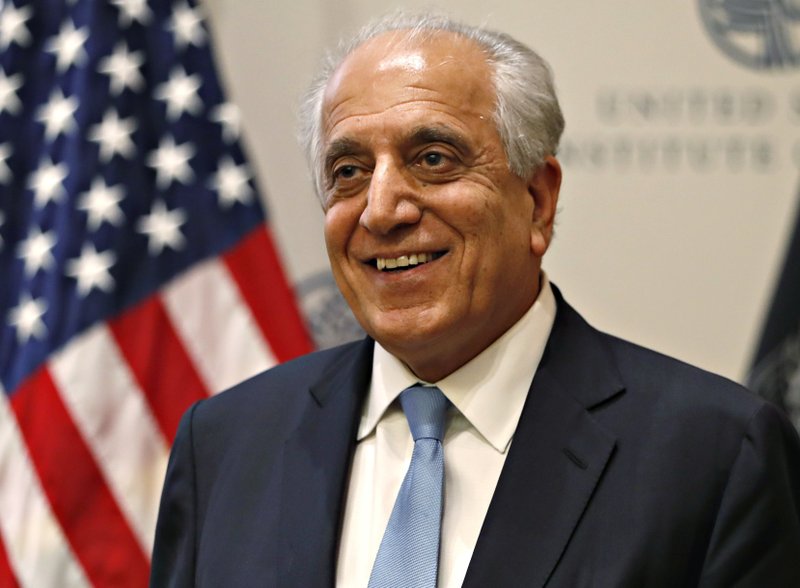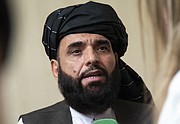WASHINGTON -- America's longest war has come full circle.
The United States began bombing Afghanistan after the attacks of Sept. 11, 2001, to root out al-Qaida fighters harbored by the Taliban. Now, more than 18 years later, preventing Afghanistan from being a launching pad for more attacks on America is at the heart of ongoing U.S. talks with the Taliban.
President Donald Trump's envoy at the negotiating table says he's satisfied with the Taliban's commitment to prevent international terrorist organizations from using Afghanistan as a base to plot global attacks. There's even talk that a negotiated settlement might result in the Taliban joining the U.S. to fight Islamic State militants, rivals whose footprints are growing in mountainous northern Afghanistan.
"The world needs to be sure that Afghanistan will not be a threat to the international community," said the envoy, Zalmay Khalilzad, who was born in Afghanistan and is a former U.S. ambassador to Afghanistan. "We are satisfied with the commitment that we have received [from the Taliban] on counterterrorism."
Not everyone is convinced.
Some Afghans worry that Trump's desire to pull American troops from Afghanistan will override doubts about the Taliban's sincerity. Early in the talks, Hamdullah Mohib, national security adviser to Afghan President Ashraf Ghani, said counting on the Taliban to control other militants could be like "having cats guard the milk."
Rep. Michael Waltz, who did several combat tours in Afghanistan as a U.S. special forces officer, said he's happy to see the Taliban are negotiating but does not see how Afghanistan can keep from becoming a hotbed for terrorists wanting to strike the United States.
"I have my doubts about the Taliban's sincerity No. 1," said Waltz, R-Fla. "But even if you buy into that ... how does the Taliban have the capability to enforce what a 300,000-man Afghan army, the United States forces and a coalition of armies around the world are continuing to struggle to do?"
The Taliban control roughly half the country, although not the cities. About 14,000 U.S. troops plus other NATO-led forces are still there. Senior intelligence officials have warned that a withdrawal could return Afghanistan to a time when the Taliban ruled a country that was an al-Qaida stronghold.
Despite nearly two decades of war, militant groups remain.
A U.N. Security Council report in April 2018 said al-Qaida was "closely allied with and embedded within the Taliban." The report said the Taliban, which have no history of conducting attacks outside Afghanistan, provide operating space for about 20 terrorist groups with thousands of fighters.
A U.S. intelligence official based in Kabul, the Afghan capital, told The Associated Press that the Islamic State group is an even bigger threat. The official, who discussed terrorist threats only on condition of anonymity, said recent Islamic State attacks in Kabul are "practice runs" for more substantial ones in the future. The official said "one of the hopes of a negotiated settlement is that it will bring the Taliban into the government and into the fight against [the Islamic State group]."
Khalilzad hasn't specifically said why he's satisfied with the Taliban's guarantee that it will prevent attacks from being plotted on Afghan soil. He says only that the "U.S. military withdrawal will be linked to the commitments the Taliban are making."
Suhail Shaheen, spokesman for the Taliban's political office in Doha, Qatar, said such guarantees will be written into law once U.S. and NATO troops leave the country.
"After withdrawal of foreign troops from the country and formation of a new Islamic government, legislation will be made that no one can use the soil of Afghanistan against U.S. and its allies," Shaheen said.
John Dempsey, senior adviser in the State Department's Bureau for South and Central Asia, said Khalilzad not only has been given assurances from the Taliban but also is discussing ways the U.S. will be able to verify them.
"He's not going into the discussions naively and taking them at their word," Dempsey said. "He's in discussions on putting in place verification and enforcement and implementation guarantees. We're not there yet."
The Afghan government announced Saturday that it was preparing for direct negotiations with the Taliban in the next two weeks.
Less than an hour after the announcement, Taliban spokesman Zabihullah Mujahid rejected it by repeating the group's long-held position -- that it would turn to "intra-Afghan" issues only after its deal with the Americans was completed.
The militant group's spokesman said the Taliban were steadfast in refusing to directly negotiate with the Afghan side until the United States announces a schedule for withdrawing the remainder of its 14,000 troops in the country.
Ghani has been skeptical of the U.S.-Taliban talks that have excluded his government, expressing concern that the United States was leaving the hard gains of the Afghan state vulnerable to a hasty deal that benefits only the Taliban.
Information for this article was contributed by Deb Riechmann and Kathy Gannon of The Associated Press; and by Mujib Mashal of The New York Times.
A Section on 07/28/2019

